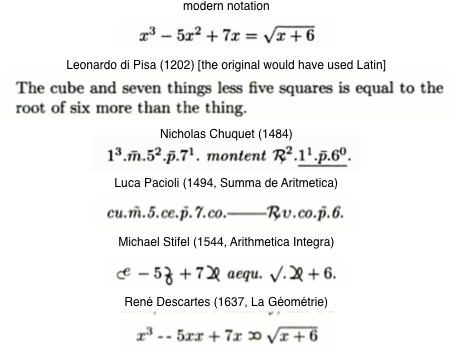History of Mathematical Notation
For a quite extensive overview with many examples, you might want to check out The origins and development of mathematical notation. I also enjoyed reading Stephen Wolfram's take on Mathematical Notation – past and future, with a great variety of illustrations.
The OP asks specifically for the evolution of one formula, "to see the big picture". Here is one example, taken from Math through the ages:

I think that the most complete source is still :
- Florian Cajori (1859-1939), A History of Mathematical Notations (1928 - Dover reprint).
We can easily find there examples regarding the evolution of "algebraic" symbolism through the modern era :
§122 page 90 : Leonardo Piasano (Fibonacci) (c.1170 – c.1250), from Liber abaci
§130 page 101 : Nicolas Chuquet (c.1445 – c.1488), from Triparty en la science des nombres
§132 page 103 : Estienne de La Roche (1470–1530), from L'Arismetique (1520)
§134-on page 106 : Luca Pacioli (c.1447–1517), from Summa de arithmetica, geometria, proportioni et proportionalita (1494)
§140 page 117 : Gerolamo Cardano (1501 – 1576) ), from Artis Magnæ, Sive de Regulis Algebraicis Liber Unus (1545)
§151 page 139 : Michael Stifel (1487 – 1567), from Arithmetica integra (1544)
§162 page 154 : Simon Stevin (1548 – 1620), from De Thiende ('the art of tenths'), first published in Dutch in 1585 and translated into French as Disme
§170 page 169 : Leonard (c.1515–c.1559) and Thomas Digges (c.1546 – 1595) , from An Arithmetical Warlike Treatise Named Stratioticos (1579)
§176 page 181 : François Viète (1540 – 1603), from Zeteticorum libri quinque (1591)
§191 page 205 : René Descartes (1596 - 1650), from La Géométrie (1637).
"The big picture" that can be seen in Carlo Beenakker's example is
Rhetorical (verbal); Syncopated (abbreviated words); Symbolic.
However, this well-known picture is very algebra-oriented and does not say anything about the use of notations in say geometry as discussed here " The Shaping of Deduction in Greek Mathematics: A Study in Cognitive History " or as asked here Uppercase Point Labels in High-School Diagrams. Thus, at least for me, the interesting answers to OP questions would be those that are not related to algebra.